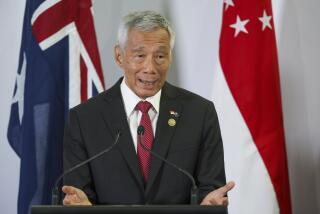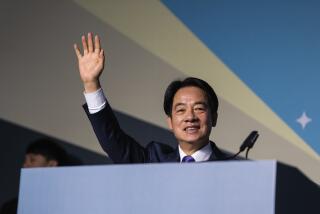Election of Hong Kong Leader Lacking in Suspense
- Share via
HONG KONG — The contest to become Hong Kong’s first leader under Chinese rule looks almost democratic.
After weeks of visiting hospitals and schools, shaking hands and fretting over popularity polls, the three men who are vying to become Hong Kong’s first chief executive under Beijing’s rule starting next July 1 presented their platforms on live television Wednesday.
“I would like to fight for [Hong Kong’s] prosperity and stability,” business tycoon Peter Woo told an audience of nearly 400 people, including trade unionists, entrepreneurs and a Buddhist monk wrapped in saffron-hued robes. “Please vote for me.”
Despite the pluralist patina, though, Hong Kong’s political process is becoming increasingly stage-managed. The new chief executive for this territory of 6.3 million people will be selected--not elected--in a process closely guided by China’s control-conscious leaders.
Even the 400 business people and community leaders charged with making the selection were themselves pre-selected by Beijing. The Selection Committee will decide Dec. 11 among the three candidates vetted by Beijing.
*
The winner already seems clear: shipping magnate Tung Chee-hwa, an energetic 59-year-old tycoon with a salt-and-pepper crew cut. He has been considered the leading contender since he was singled out by Chinese President Jiang Zemin at a Beijing reception for a king-making handshake in January.
The Selection Committee already has echoed Jiang’s apparent endorsement in a preliminary, nominating vote. Tung received 206 of the 400 ballots, while his more popular rival, former chief justice Ti Liang Yang garnered 82, and Woo squeaked by with 54--just four over the limit required to stay in the race.
“The suspense is diminishing,” said David Akers-Jones, a former British official and Selection Committee member who once conceded that China likes to know the result of an election before it starts.
After choosing the next chief executive, the same committee will select a temporary legislature Dec. 21 to replace the democratically elected body now hurriedly making laws to enshrine Hong Kong’s freedoms before the July 1, 1997, hand-over to Beijing.
Confused tourists caught a glimpse of Hong Kong’s contrasting present and likely future Wednesday, as they stepped out of the British colony’s glittering convention center into a phalanx of police warding off pro-democracy protesters. The protesters were shouting slogans at the black limousines carrying Chinese leaders.
While the chants continued outside, the Selection Committee inside politely applauded the three candidates, who spoke on a stage reminiscent of Beijing’s Great Hall of the People, with red velvet curtains and China’s national seal.
*
A mile down the road, in the colonial-style Legislative Council building, lawmakers heatedly discussed the British government’s latest bill, a proposal that would effectively protect such protesters and other dissidents after the hand-over. Legislators say they hope the measure will protect freedom of expression in the territory--or at least attract international attention if China tries to change it after 1997. The bill will be submitted next Wednesday.
“Even if the bill is passed . . . I don’t think it can survive the hand-over,” said Tsang Yok-sing, chairman of a pro-Beijing political party, noting that if it becomes law it will probably be scrapped by the handpicked provisional legislature.
Those who would supervise that effort skirted such issues back at the convention center, where the candidates for chief executive fielded questions from the Selection Committee. China’s supporters contend that the process of choosing the territory’s leader has been more open than at any time in the past. Previous governors have been appointed by London without any consultation with Hong Kong or Beijing.
Woo, 50, a Columbia University-educated banker, spoke first, joking that he’d done his democratic duty by making it appear there was an actual race.
*
Yang, often described as fair and honest but politically naive, said that Hong Kong shouldn’t face any major problems with China after the hand-over.
“We are, after all, in the same family, and there should be no conflict,” he said. Tung appeared at ease before his questioners, who sometimes began their queries with “when you are chief executive” instead of “if.”
Speaking of the challenge of balancing often-conflicting interests, Tung promised a broad-based government.
“The chief executive must maintain the confidence of Hong Kong’s 6 million people, the confidence of international investors and the confidence of [China’s] central government,” he said.
But it was clearly the confidence of China’s government that mattered most Wednesday. Tung several times criticized Hong Kong’s Democratic Party as being “anti-China on all issues.”
More to Read
Sign up for Essential California
The most important California stories and recommendations in your inbox every morning.
You may occasionally receive promotional content from the Los Angeles Times.












